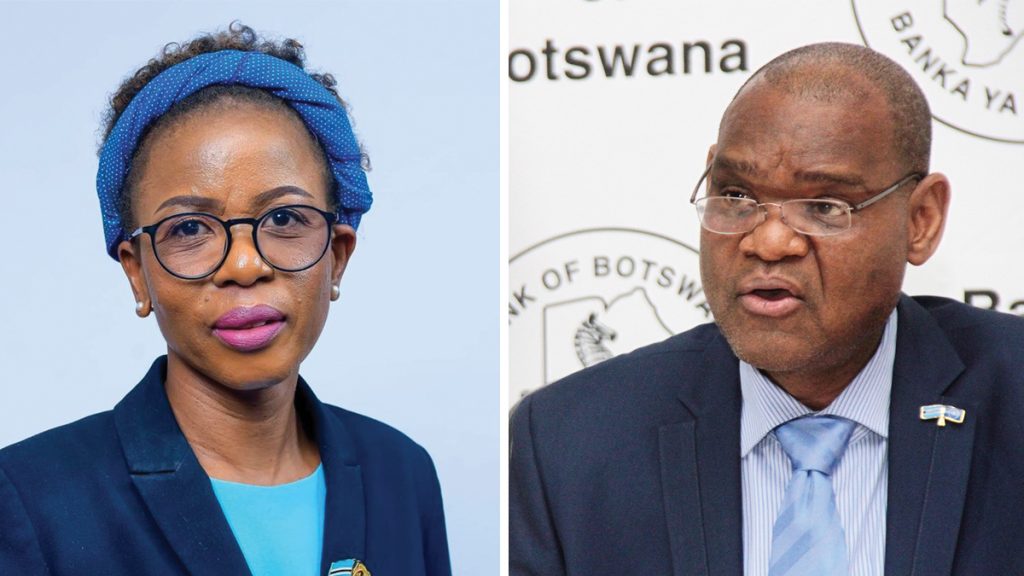Covid-19 hits hard at Govt coffers
Over P7 billion budget deficit anticipated
Weak growth of Govt revenue streams risky – expert
BAKANG TIRO
The central bank, Bank of Botswana (BoB), has disclosed that government debt and guarantees increased to P43 billion in September 2021.
This is revealed in the bank’s Financial Stability Report for October 2021 that was released last week.
The bank noted that the debt increased from P38.3 billion in September 2020. As a percent of the Gross Domestic Product (GDP), the debt was relatively unchanged at around 22 percent. According to BoB, total domestic borrowing and guarantees amounted to P23.9 billion (12 percent of GDP) in September 2021; substantially below the statutory domestic borrowing limit of 20 percent.
“External debt is estimated at 10.1 percent of GDP in the same period, which is also below the 20 percent threshold for Botswana. Meanwhile, it is also expected that the fiscal impact of the COVID-19 pandemic will be felt until the 2022/2023 fiscal year. The resultant high budget deficits imply a substantial funding requirement to stimulate economic activity amid the COVID-19 pandemic and bolster the economy’s resilience towards future shocks, which is met through domestic government bond issuance as well as external borrowing,” buttressed BoB.
Moreover, during the second half of 2021, Government secured a USD250 million (P2.8 billion) loan under the Programmatic Economic Resilience and the Green Recovery Development Policy Loan, International Bank for Reconstruction and Development (IBRD), for the financing of economic recovery.
ECONOMIC PERSEPECTIVE
Economist Dr Mosimane Rammika said the debt has been anticipated to grow owing to COVID-19, saying it was not surprising that government debt has reached the level it never reached before.
“Botswana has faced a great challenge emanating from Covid-19 pandemic. Since devastation by the pandemic, it is ideal for the country to bring life to the economy which has been hit hard.
“The option was to borrow from the available markets, which will obviously increase the debt; therefore the Covid 19 pandemic induced more borrowing. The current borrowing displays the coherent and prudent fiscal management. Reduction of debt and stimulating the economy are the general goals of most governments in the developed economies, though the approaches in these countries may be different. During the current year economic data became public that diamond revenues have already risen to a satisfactory level,” said Rammika – a research fellow at Badiphitlho Burial Society.
He said with the rising diamond revenue to pre-pandemic level, economic growth will result in deficit being brought down as the mining sector is key.
“The simple reason is that debt used to stimulate growth and increase circulation of money due to ERTP and other economic interventions will bear fruit through capital-intensive projects and in the end the person in the street will receive money over employment or short-term engagement; therefore reducing inflationary pressure felt by the public in general,” said Rammika.
2022/2023 BUDGET DEFICIT
With another deep budget deficit from the government anticipated in the 2022/23 financial year, observers say more levies and taxes could be announced by Finance Minister Peggy Serame.
The Ministry of Finance and Economic Development project budget deficit to widen to P7.8 billion this year. The economy has been hit hard by the ravaging Covid-19 pandemic whilst the government faces pressure of striking a delicate balance of saving lives as well sustaining the ailing economy.
Last year, minister Serame, while requesting for Parliament to approve the P2.5 billion loan from the World Bank stated that budget deficit may rise to P7.8 billion as compared to P6 billion deficit that was projected by ex- minister Thapelo Matsheka during the 2021/22 budget.
Dr Rammika said the significant amount of government revenues comes from the VAT increment, other levies, diamond revenues, and the expansion of copper mines as well as Southern Africa Customs Union (SACU) and this calls for imminent diversification to expand the revenue streams. He said what is motivating is that Botswana’s main sources of fiscal revenue were rising in 2021.
“The mining sector’s stronger performance will support the revenue generation as well as the government’s resource mobilisation efforts. The government has introduced a series of fiscal measures to support revenue generation starting in April 2021. The VAT increase to 14% from 12% brings Botswana’s rate closer to that of neighbouring countries such as South Africa,” he said.
